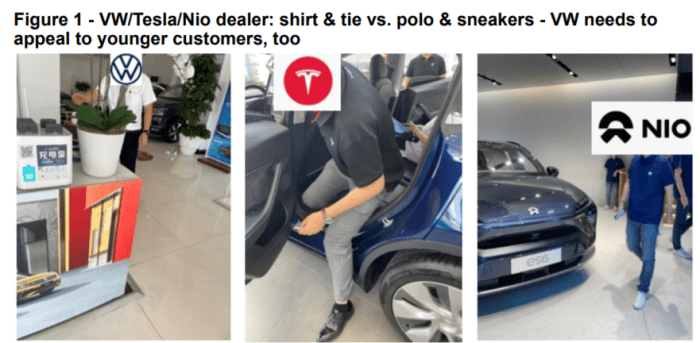This post was originally published on this site
Volkswagen has had a difficult time selling its electric vehicle ID.4 in China. According to Reuters, sales of the ID.4 were below initial hopes, and the German automobile maker sold just over 1,200 vehicles in two months. Tesla, by contrast, had sold more than 6,000 units of its Model Y, a compact sport-utility vehicle, two months after launch.
Stifel analyst Daniel Schwarz has a novel theory on why VW has struggled so far —its dealers dress too conservatively. Stifel sent mystery shoppers to VW, Tesla and Nio dealerships.

Stifel analysts have concluded that VW’s dealers dress too conservatively.
“Clearly the dealerships at VW look older than at Tesla or Nio. The sales personnel at Tesla/Nio [are] younger and [were] perceived [as] ‘more energetic and more confident’ than VW’s sales personnel — the mystery shoppers were stressing this very much, also that it influences the buying decision,” said Schwarz.
He included a photo that shows a VW salesman in a tie, compared with the more relaxed Tesla and Nio sales teams.
Schwarz said the good news was that VW itself knows it needs to improve in China, and is adding locations. “We aim for a network across both joint ventures of roughly about 150 of such prime locations in high-frequency areas in China, where also our competitors are now presenting their cars, which would be a similar-sized network as also the NEV-only brands have,” said Stephan Wollenstein, head of sales strategy, on a July 29 earnings call. NEV stands for new energy vehicle, the Chinese term for plug-in electric vehicles.
“On top of [that], we have our natural strengths with our established 2,000-unit dealer network, which, of course, is able to deliver a first-class service, which some of our competitors are certainly not able to reach because simply of the maturity in the market,” he added.
VW’s
VOW3,
preference shares have fallen 23% from their March highs. Nio
NIO,
has dropped 41% from its high, in January, and Tesla
TSLA,
is down 23% from its January highs.

